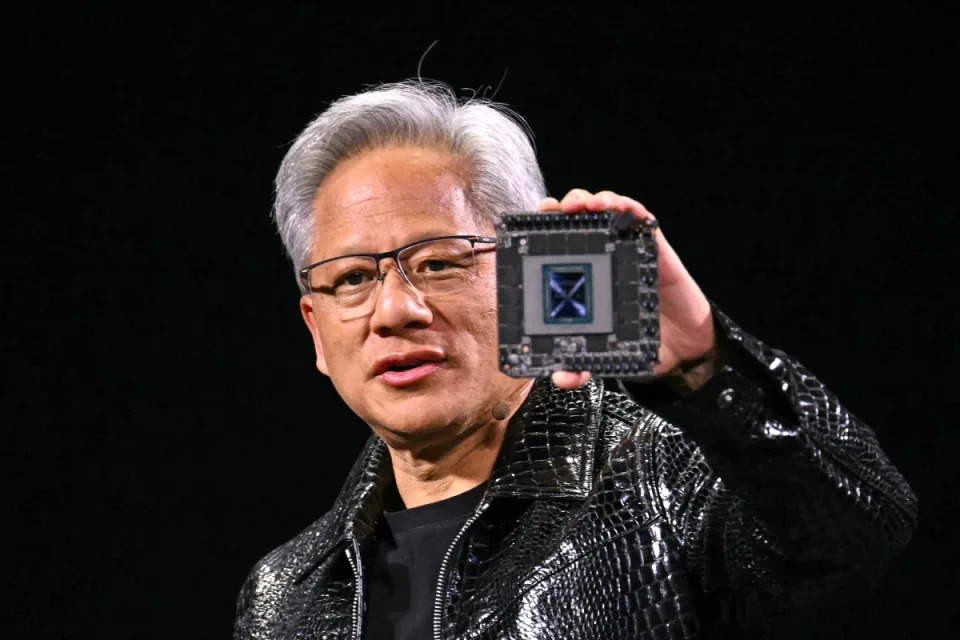Was it something I said?
Well, if you're Jensen Huang, CEO of AI chipmaking empire Nvidia ( NVDA ) , yeah, actually, it was.
Related: Fund manager who forecast Nvidia’s rally makes surprising move after CES keynote
Specifically, Huang's choice of words during a talk with analysts nuked the shares of a group of quantum computing companies.
With just a couple of sentences, the top executive and co-founder of the world's second-most valuable company behind Apple ( AAPL ) deep-fried the Next Big Thing to cinders and sent investors screaming for the exits.
Some names on the wrong side of the slaughter were Rigetti Computing ( RGTI ) , down 40% at last check. IonQ ( IONQ ) , lost 38%, D-Wave Quantum ( QBTS ) tumbled 31%, and Defiance Quantum ETF ( QTUM ) , slipped 4.4%, a relative slap on the wrist compared with the other companies' double-digit drubbing.
In case you didn't know, quantum computing is a field of computer science that uses quantum mechanics to solve problems that are too difficult for classical computers.
While today’s computers use binary electrical signals to represent ones or zeros, quantum computers employ quantum bits or qubits, which are subatomic particles.
It is being touted in many circles as the future of tech with powers and abilities far beyond those of mortal machines.
So what exactly did Huang say to make the quantum crowd melt like a snowman in Singapore?
“If you said 15 years for very useful quantum computers, that would probably be on the early side,” Huang declared. “If you said 30, it’s probably on the late side. But if you picked 20, I think a whole bunch of us would believe it.”
And that was enough to paint the town 50 very ugly shades of red.

Nvidia CEO's comments spark selling in quantum computing stocks
Huang, who gave a keynote address at the CES 2025 trade show in Las Vegas, added that he believes Nvidia will play a “very significant part” in creating the computers and helping the industry “get there as fast as possible.”
Related: 5 quantum computing stocks investors are targeting in 2025
D-Wave Quantum CEO Alan Baratz responded by saying that Huang is “dead wrong” and noted that his company is “commercial today” and its services are being used by companies like Mastercard ( MA ) today, “not 30 years from now, today.”
In all fairness, Huang is not the only one to suggest that quantum computing's day in the sun won't be any day soon.
The Boston Consulting Group said in a July study that "quantum computing today provides no tangible advantage over classical computing in either commercial or scientific applications."
"Though experts agree that there are clear scientific and commercial problems for which quantum solutions will one day far surpass the classical alternative, the newer technology has yet to demonstrate this advantage at scale," the report said.
BSG said classical computing continues to raise the bar thanks to the big strides it has taken in hardware, algorithms, and AI libraries and frameworks.
"At the same time, we are seeing undeniable progress and momentum in qubit counts, investment, and government support," the report said.
BSG said it still had confidence in its projection that quantum computing will create $450 billion to $850 billion of economic value—sustaining a $90 billion to $170 billion market for hardware and software providers—by 2040, which matches Huang's early side projection.
An earlier McKinsey survey of tech executives, investors, and academics in quantum computing found that they believe that by 2035, there will be a fully fault-tolerant quantum computer, which is a system that will still function correctly even in the presence of errors or faults.
The remaining 28% of respondents believe this milestone won’t be reached until 2040 or later.
TheStreet Pro's Stephen Guilfoyle surveyed the damage of Huang's comments and saw an opportunity.
Related: Analysts revamp IonQ, Rigetti, and D-Wave Quantum stock price targets on quantum computing outlook
Guilfoyle, also known as Sarge, told readers that the quantum computing group had scored huge gains in mid-December and “then did a wild Celtic-style dance through a semi-volatile couple of weeks where the general direction was sideways.”
The veteran trader, whose career goes back to the New York Stock Exchange floor in the 1980s, had correctly gone long some of these stocks ahead of their December surge.
Wall Street veteran goes bargain hunting trades
He said he was still long three-digit gains, "even after this morning as the entire group...is catching a severe backyard beating."
"One must ask oneself. ... Self, does Nvidia stand to gain if the quantum computing craze is pushed out a bit?" he asked. "I really am not smart enough nor educated enough on the subject to answer that question with any kind of authority."
Related: Analysts zero in on Nvidia after Consumer Electronics Show surprises
"I do know that technological development only seems to accelerate," he added, "and I have surmised that a legacy tech company that has not been a leader in the last two crazes, the cloud/data center and generative AI runs, might make an aggressive move and try to acquire growth through a merge into this space rather than try to get there organically."
The Sarge acknowledged that "Jensen Huang clearly is more knowledgeable than I on the matter."
"But we already knew that the industry that will be quantum computing is highly speculative and that valuations are more an expression of potential rather than of cash flows and profitability," he continued.
"We already 'get' that quantum computing, which makes use of quantum mechanical formula to quickly solve highly complex questions or problems, is not just in its early innings, it's still in the batting cage and the game won't start for a couple of hours," Guilfoyle said.
The Wall Street veteran observed that most of the media seems to have missed another of Huang's comments during the same appearance.
He also said, "just about every quantum computing company in the world is working with us now."
More Tech Stocks:
"Maybe the iron is hot, but Huang, who can barely keep up with AI-focused demand, just does not need the next big thing to explode just yet ... and does not want these players to shop elsewhere," Guilfoyle said.
"These are not conclusions," he added. "They are merely the thoughts that are rattling around my cranium as I try to excel in a changing environment."
He explained that he is limiting his entire exposure to quantum computing as an industry to a cap of 1.5% of his most often traded portfolio.
"I'll be adding to QUBT as it trades below $12.25 this morning. I will probably rebuild my long position in QBTS as well and I may even pick up an odd lot's worth of RGTI just to broaden my exposure to the industry," said Guilfoyle.
"This is speculative and we don't know who the players will be in Huang's 20 years (or less, maybe a lot less), nor do we know if one of the more tired legacy tech firms does something aggressive in the space," he said.
And if you think there's any fear happening here, you don’t know the Sarge.
"We've been through too much," Guilfoyle said. "We make educated choices based on what we know and what we see in an ever-changing environment. No, you can't frighten me by taking me down a notch. That only makes the fire burn brighter. Rock on, my friends. Rock on."
Related: Veteran fund manager delivers alarming S&P 500 forecast


